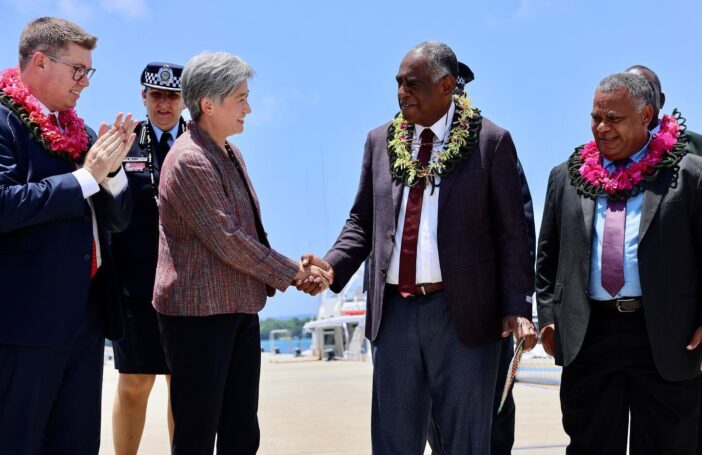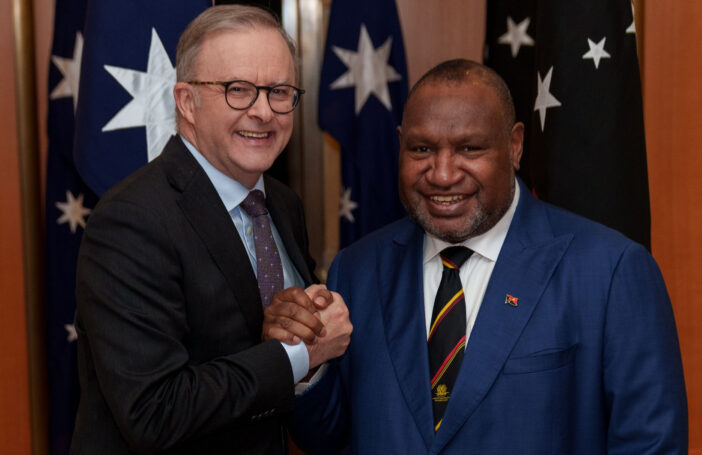On 13 August 2025, Australia and Vanuatu agreed to the Nakamal Agreement, a $500 million “win-win” partnership labelled “transformational” by the Australian Government. Unlike the 2022 bilateral security pact, which was not ratified and triggered political instability, this new deal has been approved by both Vanuatu’s National Security Council and Council of Ministers, promising, among other items, over $100 million in security assistance. Examining the two agreements shows that over the past few years, Vanuatu has been growingly assertive in the security realm.
The change illustrates what is at the heart of Vanuatu’s security governance: engaging with major partners without eroding sovereignty, integrating foreign resources into national priorities and maintaining a “friends to all, enemies to none” stance. To put it bluntly: Vanuatu is not “choosing sides”, but proactively putting itself first, an approach echoing the yumi talem, yumi mekem, yumi luk (we say it, we do it, we see it) Bislama saying.
The situation offers us a great opportunity to highlight how Vanuatu defines security. While Pacific countries have developed security strategies independently, most studies concentrate on the myriad of external partners’ strategies. After the Boe Declaration, Vanuatu was indeed the first Pacific Island country to enact a National Security Strategy (NSS) in 2019 (reviewed in 2022), structured around ten pillars addressing security goals, capabilities and challenges covering border control, human rights, cyberspace and economic development. Similar to other Pacific NSSs, Vanuatu has adopted an inward-to-outward orientation and prioritised national sovereignty.
It is worth noting that the country presents a vernacular understanding of security that transcend the rational, secular realm of conventional security provision, by touching on spiritual dimensions. Something which is different from Canberra’s approach. Security for ni-Vanuatu people is fundamentally “embedded security”: the authority of chiefs and the functioning of kastom are not abstract but anchored in a spatial logic where land, ancestors and identity converge. That is also why the $110 million promised for climate resilience in the Nakamal Agreeement are welcomed.
However, it remains to be seen if the new agreement will also address other critical issues about which scholars and activists have been more vocal, like domestic violence or explicitly including culture into security. Slow-burn issues like health security, rapid urbanization or youth unemployment (standing at 26%) indeed remain largely invisible. While youth is the future of the country, it is rarely involved in security discussions. Security in Vanuatu deserves more than being understood as an object of strategic competition: it also relates to the deeper fabric and structures of society, culture and dignity.
The Nakamal Agreement shows how Vanuatu has been successfully extracting foreign support for security development.
The Vanuatu Police Force (VPF) has been undertaking a broad institutional effort to professionalise, modernise and position the VPF as a credible and trusted regional security actor. The VPF Strategic Plan 2022-2027 and the 100-Day Strategic Action Plan made it explicit. The reforms are framed as “a movement — not a checklist” and “the beginning of what may become one of the most ambitious reform efforts in the history of the VPF”. Regionally, Vanuatu has the desire to deploy more soldiers to United Nations peacekeeping operations: a recent bilateral arrangement with Fiji will see VPF personnel trained at the Black Rock Camp in Nadi, Fiji. On the national front, the police have launched new campaigns such as Operation Spotlight against the “Joss and Josslyns” or youth on the streets.
Foreign partnerships have become essential to sustaining and scaling Vanuatu’s security ambitions as shown by its importance to maintaining the VPF’s reform momentum.
Australia has been Vanuatu’s long-standing partner of choice. The Vanuatu-Australia Policing and Justice Program (VAPJP) and the Defence Cooperation Program (DCP) serve as examples. Nevertheless, Australia being the main security partner does not disqualify other potential partners. Main does not equate to exclusive. In 2018, Vanuatu joined the Chinese Belt and Road Initiative in 2018 and lifted ties to a comprehensive strategic partnership a few years later. Prime Minister Jotham Napat also made it clear he wanted to step up, rather than step away from strengthening ties with the US. Napat put forward a traditional concept from his native Tanna island, called nasituan or mutual support, at the same time saying Vanuatu will not allow itself to become involved in the “geopolitical contest at the expense of its people, instead seeking non-aligned, balanced foreign relations”.
Through the negotiations and announcement of the Nakamal Agreement, Vanuatu has been recalling its “friends to all, enemies to none” approach. Non-alignment serves as a convenient term, conveying the idea of unrestricted and equal partnerships without favoritism. It reflects a genuine desire to reaffirm sovereignty. Sovereignty represents an exercise of agency: “sovereignty gives us the right and the power to negotiate interdependencies… Independence is choosing our interdependencies skillfully”. Used as a synonym for sovereignty, non-alignment encapsulated in the current approach symbolizes Vanuatu’s desire for freedom of action and broader desire for emancipation.
Now, can Vanuatu be truly and sustainably “friends to all, enemies to none” when it comes to national security? How can the country smoothly navigate partners’ agendas when Australia, Vanuatu’s main security partner, believes that “Pacific security should be provided by the Pacific family”?
Pacific leaders have a rare window to harness external support for security development. Doing so requires carefully navigating the risks of dependency, sovereignty erosion, potential future insecurity, and strain on economic partnerships. Extracting foreign support for security development does not come without a cost. There is a need to adopt Island-Centered Securities and focus on Pacific Island countries’ security apparatuses to prevent competing international security projects to drive actions.




